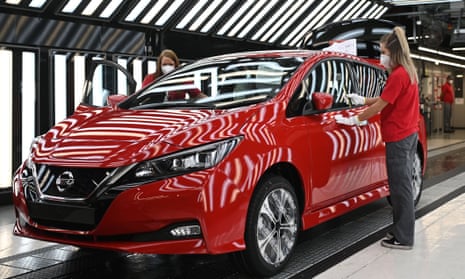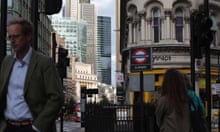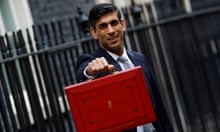Britain’s economic recovery stumbled in May when growth slowed to 0.8% after a boost from the reopening of indoor hospitality was offset by a contraction in building work and a slump in car production.
It was the fourth consecutive month of GDP growth, and followed 2% growth in April, but the slowdown in May was sharper than expected after City economists had forecast a 1.5% increase.
The Office for National Statistics (ONS) said the manufacturing industry was hit by a shortage of computer chips that forced car companies to cut back production.
As a result, transport equipment manufacturing fell by 16.5% on the previous month, its largest fall since April 2020 and the worst period of the coronavirus pandemic.
Shortages of timber and steel, combined with severe weather conditions, brought many building projects to a standstill and led to the construction sector shrinking for a second consecutive month by 0.8%.
Over the three months to May, GDP grew by 3.6% compared with the previous three months, mainly because of strong retail sales over the period as non-essential shops, bars and restaurants opened their doors.
Rory Macqueen, a principal economist at the National Institute of Economic and Social Research, said the hospitality sector accounted for 0.7 percentage points of May’s 0.8% growth, which showed that “underlying growth is moderate outside the sectors being unlocked, with supply constraints contributing to the continuing recent stagnation in manufacturing”.
He added: “It remains to be seen whether the lifting of further restrictions in July contributes to a continuation of strong growth in the third quarter or – if cases of Covid-19 continue to rise – increased caution among consumers and even another national lockdown.”
The ONS said the broader services sector grew as the Covid-19 restrictions continued to ease, more people returned to work and a larger number of pupils attended school.
The dominant service sector – which includes retail, hospitality, leisure and banking – grew by 0.9% in May, driven by a 37.1% rise in accommodation and food service activities as restaurants and pubs welcomed customers back indoors.
“Despite growth in consumer-facing services, it is travel, transport and other personal services that continue to contribute to output remaining below pre-pandemic levels,” the ONS said.
Quick GuideWhy is there a global computer chip shortage?
Show
The global shortage in semiconductors, the microchips that are an essential component in every electronic device in the world, started as a temporary delay in supplies as chip factories shut down when the coronavirus pandemic first hit.
However, while factory production has returned to normal, the shortage has become a global crisis, with a new surge in demand leading to companies fighting to secure the limited supplies coming to the market.
Apple, the world’s biggest buyer of semiconductors – spending $58bn (£41.7bn) annually – was forced to delay the launch of the iPhone 12 by two months last year because of the shortage. Sony has warned it may not hit sales targets for the new PS5 console this year because of chip supply problems, and Samsung, the second biggest producer and consumer of chips in the world, said it might have to postpone the relaunch of its high-end smartphone.
However, the hardest hit sector has been the global automotive industry. Car manufacturers are relative newcomers to the semiconductor industry, as investment in tech-heavy electric vehicles increases, and have found themselves at the back of the supply queue. The biggest automotive players, Toyota and Volkswagen, spend about $4bn annually on chips, making them relative minnows in the supply chain.
Ford has been forced to cancel shifts at two car plants and said profits could be hit by up to $2.5bn this year, Nissan is idling output at some plants in Mexico and the US, and General Motors has warned of a $2bn profit hit.
The battle for chip supplies has also sparked governmental concerns. Earlier this week, Boris Johnson said the UK government would step in to review the purchase of the UK’s largest producer of semiconductors by a Chinese-owned manufacturer, under the new National Security and Investment Act 2021 designed to protect key infrastructure businesses from foreign takeovers.
The shortage is forecast to last until 2023 because new chip factories are highly complex to build and take up to two years to become operational.
Mark Sweney
Trade figures also published on Friday showed the recovery in trade with the EU continued in May after a severe post-Brexit dip in January and February. There was an 8.8% jump in goods exports to the EU and a 0.8% rise in imports from the 27-member union, narrowing the overall trade deficit.
However, there was a 13% fall in exports and imports from the EU to the UK when comparing the 12 months up to May 2018 against the same period to May 2021.
William Bain, head of trade policy at the British Chambers of Commerce, said: “So, while we are seeing a modest pickup in demand for UK goods in the last month as economies reopen, the overall climate remains fragile.”
The ONS said the economy was 3.1% smaller in May than it was in February 2020, before the pandemic.
Samuel Tombs, chief economist at consultancy Pantheon Macroeconomics, said growth in GDP was likely to slow further over the summer. “An array of indicators suggest that economic activity stabilised in June. This probably partly reflects the fading of some initial enthusiasm when businesses reopened.
“Rising Covid-19 infections also appear to be prompting some people to work from home again and to visit shops and services venues less frequently. What’s more, the UK’s self-isolation rules increasingly are constraining labour supply,” he said.
An increase in mining and quarrying and a surge in electricity consumption during the cold snap in May allowed the production sector to grow by 0.8%, though manufacturing output edged down 0.1% after the dive in vehicle production.
Rishi Sunak said government support for the economy had allowed it to maintain momentum through May.
“Our unprecedented package of support – including business loans, the furlough scheme and a reduced rate of VAT for the hospitality and tourism sectors – has protected millions of jobs and helped businesses survive the pandemic,” the chancellor said.
“And with the number of people on furlough halving in just three months as the economy reopened, it is clear our plan for jobs is working.
“The government is continuing to support the recovery, with the furlough scheme in place until September and schemes like Restart helping people who have sadly lost their jobs get back into work.”
The general secretary of the TUC, Frances O’Grady, said: “The chancellor must respond to the slowdown in growth to keep the recovery moving. Cutting support for families, and reducing support for employers too soon, are big risks. He should cancel the £20 cut to universal credit and delay the increase in employer contributions to the furlough scheme.”








